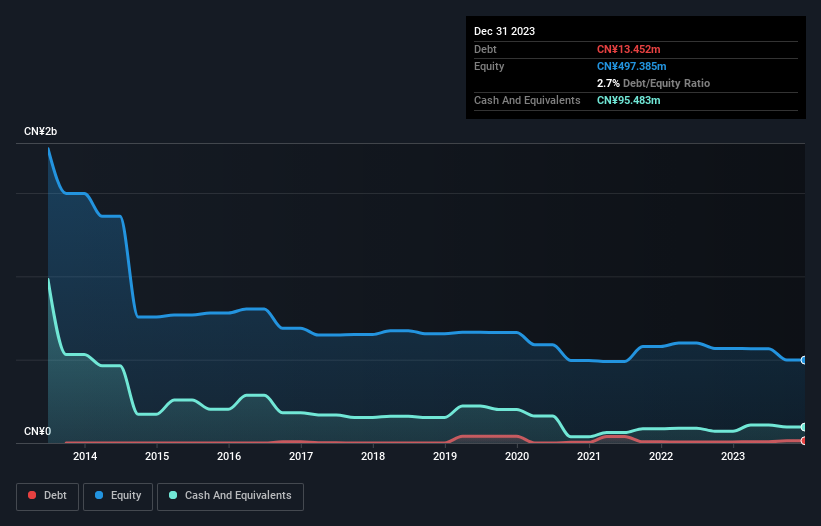Is China Tontine Wines Group (HKG:389) Using Debt Sensibly?

Legendary fund manager Li Lu (who Charlie Munger backed) once said, 'The biggest investment risk is not the volatility of prices, but whether you will suffer a permanent loss of capital.' When we think about how risky a company is, we always like to look at its use of debt, since debt overload can lead to ruin. Importantly, China Tontine Wines Group Limited (HKG:389) does carry debt. But should shareholders be worried about its use of debt?
Why Does Debt Bring Risk?
Generally speaking, debt only becomes a real problem when a company can't easily pay it off, either by raising capital or with its own cash flow. Ultimately, if the company can't fulfill its legal obligations to repay debt, shareholders could walk away with nothing. While that is not too common, we often do see indebted companies permanently diluting shareholders because lenders force them to raise capital at a distressed price. Of course, plenty of companies use debt to fund growth, without any negative consequences. The first thing to do when considering how much debt a business uses is to look at its cash and debt together.
See our latest analysis for China Tontine Wines Group
What Is China Tontine Wines Group's Debt?
The image below, which you can click on for greater detail, shows that at December 2023 China Tontine Wines Group had debt of CN¥13.5m, up from CN¥6.30m in one year. However, its balance sheet shows it holds CN¥95.5m in cash, so it actually has CN¥82.0m net cash.

How Healthy Is China Tontine Wines Group's Balance Sheet?
According to the last reported balance sheet, China Tontine Wines Group had liabilities of CN¥52.7m due within 12 months, and liabilities of CN¥3.38m due beyond 12 months. On the other hand, it had cash of CN¥95.5m and CN¥124.8m worth of receivables due within a year. So it actually has CN¥164.3m more liquid assets than total liabilities.
This luscious liquidity implies that China Tontine Wines Group's balance sheet is sturdy like a giant sequoia tree. Having regard to this fact, we think its balance sheet is as strong as an ox. Succinctly put, China Tontine Wines Group boasts net cash, so it's fair to say it does not have a heavy debt load! When analysing debt levels, the balance sheet is the obvious place to start. But you can't view debt in total isolation; since China Tontine Wines Group will need earnings to service that debt. So when considering debt, it's definitely worth looking at the earnings trend. Click here for an interactive snapshot.
Over 12 months, China Tontine Wines Group reported revenue of CN¥189m, which is a gain of 29%, although it did not report any earnings before interest and tax. Shareholders probably have their fingers crossed that it can grow its way to profits.
So How Risky Is China Tontine Wines Group?
Although China Tontine Wines Group had an earnings before interest and tax (EBIT) loss over the last twelve months, it generated positive free cash flow of CN¥18m. So although it is loss-making, it doesn't seem to have too much near-term balance sheet risk, keeping in mind the net cash. We also take heart from the solid 29% revenue growth in 12 months; undoubtedly a good sign. So this may well be an interesting business to watch grow. When analysing debt levels, the balance sheet is the obvious place to start. However, not all investment risk resides within the balance sheet - far from it. We've identified 3 warning signs with China Tontine Wines Group (at least 1 which doesn't sit too well with us) , and understanding them should be part of your investment process.
When all is said and done, sometimes its easier to focus on companies that don't even need debt. Readers can access a list of growth stocks with zero net debt 100% free, right now.
New: AI Stock Screener & Alerts
Our new AI Stock Screener scans the market every day to uncover opportunities.
• Dividend Powerhouses (3%+ Yield)
• Undervalued Small Caps with Insider Buying
• High growth Tech and AI Companies
Or build your own from over 50 metrics.
Have feedback on this article? Concerned about the content? Get in touch with us directly. Alternatively, email editorial-team (at) simplywallst.com.
This article by Simply Wall St is general in nature. We provide commentary based on historical data and analyst forecasts only using an unbiased methodology and our articles are not intended to be financial advice. It does not constitute a recommendation to buy or sell any stock, and does not take account of your objectives, or your financial situation. We aim to bring you long-term focused analysis driven by fundamental data. Note that our analysis may not factor in the latest price-sensitive company announcements or qualitative material. Simply Wall St has no position in any stocks mentioned.
About SEHK:389
China Tontine Wines Group
An investment holding company, produces and sells grape wine in the People’s Republic of China.
Moderate and good value.
Market Insights
Community Narratives



